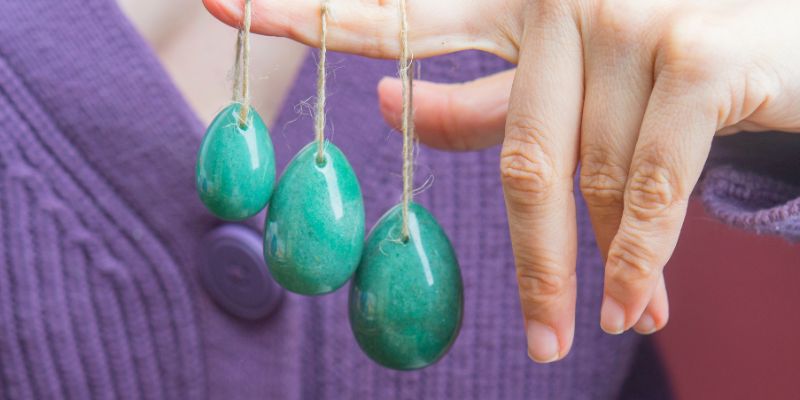Yoni Pearls are also known as Yoni eggs. It involves inserting the pearl into the vagina and doing spiritual, meditative, or physical practices designed to harness its proposed powers. After use, the pearls are removed, cleansed, and reused over time. Some recommend wearing them overnight or longer. Most medical and scientific authorities strongly advise against the use of yoni pearls due to risks like infection, injury, pain, and no evidence of benefits.
Even if properly cleaned, the pearls can pick up new bacteria once inserted. And if left in too long (as some recommend), they allow more time for the bad bacteria to grow and infect. An impaired vaginal environment can then lead to pain, discharge, urinary issues and other problems.
Injury Hazards
Trying to retrieve a stuck pearl can lead to even further injury and complications. The vagina is not an infinitely large cavity, so only objects specifically designed for safe insertion should go inside.
No Proven Benefits
A major reason to avoid yoni pearls is that there is no solid scientific evidence showing they provide any real benefits for health or wellness. The promised improvements for fertility, sexual pleasure, hormonal balance, spirituality and more lack legitimate research support. Any positive effects users report are likely just placebo.
Some providers of yoni pearls cite ancient traditions around their use as proof they work. However, old wisdom frequently proves ineffective or even harmful when examined more closely. Without quality clinical trials demonstrating both the efficacy and safety of yoni pearls, no one can confirm they actually provide the benefits claimed.
Not Approved Medical Devices
Unlike regulated medical devices designed for vaginal insertion like menstrual cups, yoni pearls have no oversight around their design, production or claims. No government agency checks that they are safe, effective and manufactured properly before businesses sell them with health promises. That means quality control and safety monitoring are totally lacking.
Using an unregulated product with no liability means assuming all the risk yourself with no recourse if something goes wrong. Legal medical devices must go through extensive testing to earn approval showing they work as advertised and won’t routinely harm patients. Yoni pearls have evaded this approval process by making no medical claims, but the implied benefits still lure consumers into using them.
Ethical Concerns
Some additional arguments against the use of yoni pearls relate to ethical and feminist issues. Promoters of yoni pearls often emphasize supposed benefits around connection to “ancient feminine wisdom” or making your vagina more pleasing for male partners. Framing women’s health choices around pleasing men promotes the misogynistic view that women’s bodies exist for male benefit.
Final Words
There are also environmental sustainability issues relating to some materials used in yoni pearls. Certain varieties use real pearls or gemstones, fueling ecological damage from mining industries to produce unnecessary luxury items solely for supposed vaginal health benefits.
While people have the right to make their own choices for their bodies, the wellness claims around yoni pearls enable exploitation of those seeking help they likely won’t receive from this option. More education is needed so people can make fully informed decisions.
The risks of physical harm, infection, and being misled or exploited make using yoni pearls clearly more dangerous than any potential upsides. Unless future research eventually proves both their safety and efficacy, women are better directed towards regular vaginal health options already supported by science. While perhaps tempting from the promises, using yoni pearls isn’t worth the risks for unproven benefits.
FAQs
Q: Can yoni pearls help treat vaginal infections?
A: No, there is no evidence that yoni pearls treat existing infections. Inserting them into an already imbalanced vaginal environment could make infections worse by introducing more bacteria. Proven medical treatment should be sought instead.
Q: Are there any health conditions that make using yoni pearls especially dangerous?
A: Yes, those with sensitivities like vaginismus or past trauma should never insert foreign objects vaginally without medical guidance. Additionally, those prone to UTIs may be at greater infection risk from using pearls. People with IUDs or other lodged vaginal devices absolutely should not use yoni pearls.
Q: What if I sterilize a yoni pearl properly first?
A: While sterilizing may limit some risks, it does not remove them all. The pearl can still develop bacteria once inside the vagina. And sterilization limits injury risks either. So while it might reduce some hazards, it is still an unnecessary risk given the lack of evidence for benefits.
Q: Could using yoni pearls impact my ability to conceive later?
A: There is no research either way on yoni pearls affecting future conception chances. However, given infection and scarring risks that could impact fertility, avoiding their use when trying to conceive would be wise as a precaution.
Q: Are organic or “natural” yoni pearls safer options?
A: No current research compares material types of yoni pearls for safety profiles. However, all carry roughly similar basic risks since they involve vaginal insertion of a non-medical foreign body. Any promised safety based on raw materials or production methods is unsupported.







